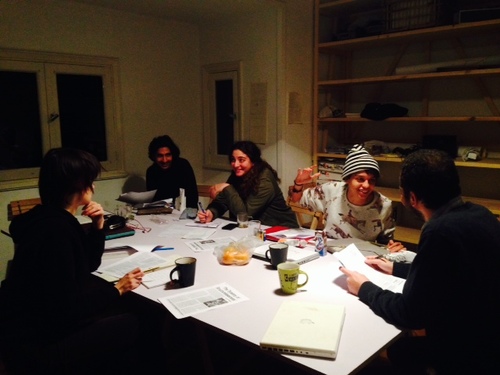More/Education
04.–18.12.2014
Imaginary School Program
December Session
In December the Imaginary School Program takes time for itself, and its own understanding of collectivity. We listen and share experiences with other students and diverse practitioners. Yemeni visual artist Salwa Aleryani tells us of another educational experiment she is currently involved in: this year’s HomeWorks Program titled “Setups/Situations/Institutions”, run by Ashkal Alwan in Beirut. With the support of Farida Makar participants weave their own module into the program’s structure, and reclaim space to become more curatorially active in its future. Together with Lina Attalah we produce words collectively, around the claims of existence, and of imagination and legitimacy of our own program.
Our inquiry directs its focus on the practice of larger local institutions acting in the realm of civil society, and on how they have been influenced by neoliberal management models. Amr Abdelrahman analyses the Meeting Minutes of the Egyptian Organization for Human Rights, looking at the debate of the early 1990s, after which many local organizations started reshaping their governance after different business models.
We look at the practice of foreign funding in the human rights and cultural sectors. We meet the Egyptian Initiative for Personal Rights and discuss its current organizational reformations. Ilka Eickhof introduces her PhD-research on structures and dynamics of Cultural Foreign Funding in Cairo, and talks about symbolic power and knowledge production, the myth of the gift and politics of development, fast judgments and mutual interests. Hana El Bayaty and Melanie Bouteloup from Bétonsalon share their individual experiences around practices of funding, in Egypt and France, and different modes to resist, change or adapt vis-à-vis the pragmatics of realizing projects.
In parallel tISP encounters individuals working on alternative organizational formats. Mohammed Abdallah familiarizes us with his research for Cimatheque drafting an organizational model coherent with its aims and positions. He talks about the successes and failures of its cellular model and scrutinizes “The Tyranny of the Structurelessness” by Jo Freeman with the participants. Jasmina Metwaly introduces the idea of collectivity from the perspective of the crowd and the individual. Taking Mosireen as a starting point she questions what constitutes collectives. Crowds, pure and organic in the early days of the revolution, factory workers invisible but organized in its aftermath, a voice of counterpropaganda to the Supreme Council of Armed Forces, all appear in videos realized by Mosireen, a crowd itself resulting of a crowd of the revolution.
Contributors to this session include:
Lina Attalah, Salwa Aleryani, Farida Makar, Mohammed Abdallah, Ilka Eickhof, Melanie Bouteloup, Hana El Bayaty, Karim Medhat Ennarah, Amr Abdelrahman, Jasmina Metwaly, Beirut
